How was GATE 2017?
Following are experiences of GATE 2017
Vasudha says: It was tough comparatively to previous year … No pattern followed…there so many questions related to maths purely… That to not general aptitude maths… What does icrosat satellite does is none of an architects business.
Divya says: Gate AR 2016 was easier.
Vignesh says: Yes the numericals were easy and direct and so were the aptitude part. But the main architecture part was a bit tricky and confusing but still weren’t too hard either.overall a modest paper slightly tougher than last year’s.
Angha says: This time the GATE was moderate.difficulty level was quite high.also in mcq’s options were quite difficult.numericals this time were more than last year.There were questions regarding tree of columnar type,National Rurban mission,smart city scheme,structural elements of structures,Tuscan and composite columns ,materials used in ancient buildings of India,styles in architecture etc.
Anonymous says: (Written below. It was a different experience, so we made graphics)

Shrey says: The paper was quite difficult this time as compared to previous years.The numericals were little tricky and also the architecture theory questions were little weird and on a difficult side.
Abhinav says: I cant understand the paper pattern .in the qstn paper missed so many technical topic . a one qstn is related to conference agenda why ask this qstn too much numerical problem based on aptitude test. in a 2 marks qstn only two type of qstn 1 is matching and another one is numerical.
Garima says: The paper was tough ,previous year question papers had some pattern ,but 2017 paper was very tricky and didn’t follow any pattern ,even in match based questions ,if a person knows 3 answers ,then he/she will get confused in the last option.
Share your experience at: [email protected] or in the comment below.
This page is dedicated to all wonderful people that contributed for development of this page by discussions, providing questions just after the GATE exam, answer with solution, insights & lot more. Thank you. _/\_
Please note that if you are posting for 1st time, your comment/s will not be displayed immediately. It will take some time (1 hour for example) to keep this website safe from spammers. Inconvenience is regretted. Afterwards, you may post unlimited number of times.
GATE QUESTION 2017
We have matched the answer with the answer key provided by GATE official. Aspirants were invited to challenge the answer provided by GATE official. Doing so, answer of two questions were revised. Answer to the question “GRIHA Ceritfication” was either (A), (B) or (C). Answer for the question “Pigment Volume Concentration” was changed to 40. There are few more questions that should have been reviewed.
Q.1 Match the architectural movements in Group-I with their proponents in Group-II.
| GROUP I | GROUP II | ||
| P. | Deconstruction | 1. | Joseph Paxton |
| Q. | Historicism | 2. | Kenzo Tange |
| R. | Metabolism | 3. | Walter Gropius |
| S. | Art Nouveau | 4. | Victor Horta |
| 5. | Frank O. Gehry | ||
(A) P-5, Q-1, R-2, S-4 (B) P-5, Q-4, R-2, S-3
(C) P-5, Q-2, R-3, S-3 (D) P-2, Q-4, R-1, 5-5
Answer: (A) If you knew Victor Horta, the question could have been so easy.
Art Nouveau is a French word meaning “New Art”. Belgium was an early center of the art nouveau, thanks largely to the architecture of Victor Horta, who designed the first art nouveau houses, the Hôtel Tassel in 1893, and the Hôtel Solvay in 1894.
Q.2 The Pritzker Architecture prize for the year 2016 has been awarded to
(A) Alejandro Aravena (B) Frei Otto
(C) Stephen Breyer (D) Yung Ho Chang
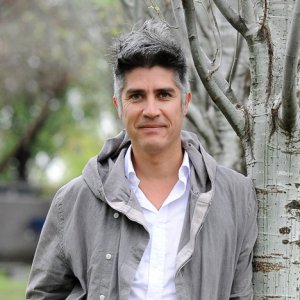
Pritzker Architecture Prize 2016 Alejandro Aravena
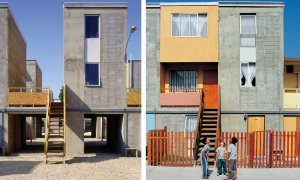
There are two photographs here. Aravena provided a concrete frame, with kitchen, bathroom and a roof (left), which were designed to allow families to fill in the gaps (right). So, the architect provided a basic concrete frame, complete with kitchen, bathroom and a roof, allowing families to fill in the gaps, and stamp their own identity on their homes in the process. Photograph: Cristobal Palma, Source: www.theguardian.com
Answer: (A) Alejandro Aravena
The architect Alejandro Aravena is from Chile. Runs a design firm ELEMENTAL. He is known his pioneering social housing projects in Latin America.
Q.3 The unit for measuring sound absorption in a room is
(A) Sabin
(B) Phon
(C) Decibel
(3) Hertz
Answer: (A) Sabin
The term “sound absorption” very common to acoustics and question is asked very frequently in GATE for calculating Reverberation time = 0.016x(V/a), where a = sound absorption coefficient in Sabin.
The unit is named in honor of Wallace Clement Sabine. So, Sabin is a unit of Sound Absorption of a surface. A square metre of 100% absorbing material has a value of 1 metric sabin. An example of this would be a 1 m² open window. One square foot of 100% absorbing material has a value of 1 imperial sabin.
Q.4 A drainage basin of 180 hectares comprises 40% wooded area, 45% grassed area and 15% paved area. Runoff coefficients for wooded, grassed and paved areas are 0.01, 0.2 and 0.95 respectively. The composite runoff coefficient for the drainage basin is
Answer: 0.24
C = [(0.01x 40% of 180)+ (0.2 x 40% of 180) + (0.95 x 15% of 180)] / 180 = (0.72 + 16.2 + 25.65)/180 = 0.236 = 0.24
Solution: Composite runoff coefficient, C = (A1.C1+ A2.C2 + …) / (A1+A2 + …)
Question 4.2: What is volume of a store room of dimension 2.3m x 2.3m x 2.3m in cubic meter?
(A) 12.167 (B) 12.2 (C) 12.17 (D) 12.16
Q.5 Match the classical urban planning theories in Group-I with their proponents in Group-II
| GROUP I | GROUP II | ||
| P. | Concentric Zone Model | 1. | Beny and Horton |
| Q. | Sector Model | 2. | Homer Hoyt |
| R. | Multiple Nuclei Model | 3. | Ernest Burgess |
| S. | Factorial Ecology | 4. | Shevky and Bell |
| 5. | Harris and Ullman | ||
(A) P-4, Q-1, R-3, S-5 (B) P-3, Q-2, R-3, S-5
(C) P-2, Q-4, R-5, S-1 (D) P-3, Q-2, R-5, S-1
Answer: (D)
Q.6 Find the ‘Lux’ at a distance of 3 m from the light source. The light source has power of 40 Watts and Efficacy of 40 lm/W.
(Courtesy: Rama Shirwalkar)
Answer: 178
(40Watt x 40 Efficacy) / (Square of 3m) = 1600/9 = 178 lux (Answer provided by Abhishek)
Solution: First find, how much lumen the light source emits. Luminous Efficacy helps out to find that.
Luminous efficacy is a measure of how well a light source produces visible light. It is the ratio of luminous flux to power, measured in lumens per watt in SI.
So, Luminous efficacy = (Lumen)/(Power in Watt)
Here, 40 = Lumen/ 40
Therefore, lumen = 40 X 40 = 1600
Now apply “Inverse square law” which says; The intensity of illumination is proportional to the inverse square of the distance from the light source.
Lux found = (lumen of light source)/(square of distance) = 1600/9 = 178 lux Answer
Q.7 For GRIHA certification, minimum points required to obtain is
(A) 35 (B)50 (C) 60 (D)100 (Courtesy: Diya)
Answer: (B) 50 points Reference: Link here
Q8. A pointed arch having two centres and radii greater than the span is known as
(A) Lancet arch (B) Gothic arch
(C) Roman arch (D) Drop arch
(Courtesy: Sadhana)
Answer: (A) Lancet arch
Q9. As per the CPWD Handbook on Barrier Free and Accessibility, 2014, Government of India, the minimum length of a straight ramp in metre to raise a wheelchair to the plinth level of 600 in m is
(Courtesy: Abhinav)
Answer: 7.2
1:12 is the recommended slope by CPWD
So, for 1mm rise, the length would be 12mm.
Therefore, for 600mm rise, the length would be 12x600mm = 7.2 meter
(Answer provided by Rama Shirwalkar)
Q10. For a project to complete, the Optimistic time is set to 12 months, the Most likely time is set to 14 months & the Pessimistic time is 18 months. What would be the expected time for completion?
(Courtesy: Rama Shirwalkar)
Answer:15
Completion time = [(Optimistic time) + 4*(Most likely time) + (Optimistic time)] / 6
So, [12+ 4*14+18]/6 = 86/6 = 15 Months
(Answer provided by Soham Karmakar )
Q11. In 2011, the population of a town was 5,00,000 and the nuunber of housing units were 1,00,000.
Calculate the additional number of dwelling units (DU) required by 2031 so that there is no housing shortage. The assumptions are:
- 5% decadal increase in population
- New DU to be completed by 2021 is 10,0003.
- Number of DU which will become non habitable by 2031 is 5,000
- Average household size is 4.5
(Courtesy: Ann)
Answer: 17500
122500-105000=17500
(Answer provided by Rama Shirwalkar)
Q12. ArchiCAD, AutoDesk Revit, Digital Project Designer (CATIA) and Vector Works Architect are examples of
(A) Statistical Analysis software (B) GIS software
(C) BIM software (D) Image processing software
Answer: (C) BIM (Building Information Modelling)
(Question & Answer provided by Abhinav)
Q13. Find the velocity of “Constricted end” if non-constricted end had velocity 2m/s and diameter of constricted end was half of that of the non constricted.
(Courtesy: Rama Shirwalkar)
Answer: 8
This question is related to water supply (fluid dynamics)
v1 x a1 = v2 x a2
That way, v2 = v1 x a1/a2 = v1 x (r1)^2/(r2)^2
= 2 x 4 = 8 m/s
(Answer provided by Soham Karmakar )
Q14. Fee of contractor for a project has the following provisions
- Basic fee = 15% of actual cost of work incurred
- Bonus = 20% of savings from estimated cost of work
- Penalty = 20% of cost overrun
If the estimated cost of the project is Rs. 60,000, and the actual cost is Rs. 70,000, then the total fee of contractor in Rupees is
(Courtesy: Rama Shirwalkar)
Answer: 8500
His fees 15% of total project cost 70k was 10500 – 20% penalty for overrun cost 2000= 8500
(Answer provided by Apporva Sindhe)
Q15. Which of the following road elements are used to design speed limits at turns to ensure safety of a vehicle travelling ?
(A) Footpath (B) Median (C) Super elevation (D) Shoulder
(Courtesy: Abhishek)
Answer (C): Super elevation
(Answer provided by Rama Shirwalkar and Abhinav)
Q16. A site has a unidirectional slope of 30° with horizontal along its longer side. The projected dimensions of the site on the horizontal plane measures 30 m x 40 in. Using cut and fill method the site has to be levelled parallel to the horizontal plane. The minimum amount of earth to be excavated in cubic metre is

Volume = Area of triangle x 30m
(Courtesy: Rama Shirwalkar)
Answer: 3464
Solution: Let us, first find x.
Tan30° = x/40, x= 40*Tan30° = 40*(1/√3) = 23.09m
So, Area of triangle = 1/2*(Base)*(Height) = 0.5*40*23.09 = 461.8 square meter
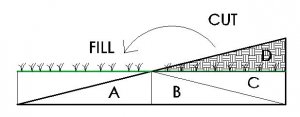
Area of triangle A = B = C = D. So, minimum cut = 13854/4
So, Volume of earth = (Area of triangle)*(length of plot) = (462.42 square meter)*(30meter) = 13854cubic meter
For minimum cut, answer = 13854/4 = 3364 Answer
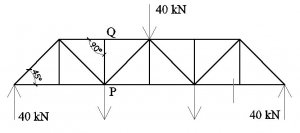
Find the vertical force on the member PQ
Q17. For a symmetrical two dimensional truss as shown in the
given figure, vertical force in kN acting on the member PQ is
Answer: 0 (Answer provided by GATE official)
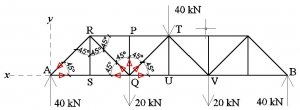
Sum of external force must be zero. So, 40+40-40 =40kN must be acting downward. As the truss is symmetrical, this 40kN must be equally divided at point Q & V. So, downward external force at Q be 20kN and at V be 20kN.
To solve this type of question, we must consider two things:
(i) Resolve all forces in x-axis & y-axis.
(ii) Always start from a point where there are minimum number of truss components. Here, the point is A (two truss member, A-S & A-R)
So, let us first consider point A,
∑Fy =0
⇒ +40kN – Fy(ra) = 0
⇒+40kN -F(ra)*Cos45° = 0
⇒F(ra) = 40√2……………………………………………..(a)
∑Fx =0
⇒-Fx(ra) + F(as) = 0
⇒-F(ra)*Cos45° + F(as) = 0
⇒ F(as) = 40√2*Cos45° = 40kN…………..from equation (a)
So, therefore, Force on truss-member A-R = 40√2 kN & force on truss-member A-S = 40kN
Now, consider triangle Δ RAS (Force behave same as if they are sides of a triangle. In simple term, if you know two sides of a triangle, you can always find the length of third side. Example, consider a triangle with sides 3cm, 4cm & 5cm. In the same triangle if there are two known forces of 3kN & 4kN, the third force must be of 5kN)
So, In Δ RAS, force on truss-member S-R = 40kN
By symmetry,
force on truss-member A-S = force on truss-member S-Q = 40kN
In Δ RAS, We know forces on truss-member R-S & S-Q. So, the force on truss-member Q-R = 40√2 kN
Again by symmetry, Force R-Q = Force Q-T = 40√2 kN
Now, consider y-component of forces on point Q:
F(pq) +Fy(rq) + Fy(qt) = 20kN
⇒F(pq) +2*Fy(rq) = 20kN…………{ Fy(rq) =Fy(qt) by symmetry
⇒F(pq) +2*40kN = 20kN
⇒F(pq) = 60kN Answer
(Courtesy: Rama Shirwalkar)
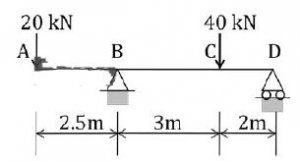
Find bending moment at C
Q18. Value of bending moment in kN-m at point C for a beam as shown in the given figure is
(Courtesy: Rama Shirwalkar)
Answer: 28
Solution: Let, force acting at point D be F.
Now, consider point B.
Bending moment due to force on left side of point B = Bending moment due to force on right side of point B
So, 20kN*2.5m = 40kN*3m + F*5m
⇒ F = 14kN
Therefore, bending moment at C = Force x distance = 14kN*2m = 28 kN-m Answer
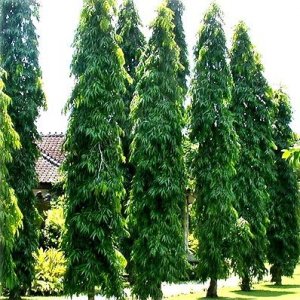
Polyalthia Longifolia. It’s native name is Ashok
Q19. Which tree is in columnar form
(A) Tamariudus indica (B) Delonix regia (C) Polyalthia Longifolia (D) Callistemon lanceolatus
(Courtesy: Abhinav)
Answer (C) Polyalthia Longifolia
Q20. As per National Building Code of India, 2005, the maximum number of occupants per unit exit width of a doorway is 60, where unit exit width is 500 nun. The maximum permissible occupants in a theatre having four number of 2.2m wide doors will b_________
(Courtesy: Rama Shirwalkar)
Answer: 960 (Answer provided by GATE official)
For solution, see comment/s at bottom of this page!
(Answer provided by Ann)
Q21.In year 2001, a district with 4,000 manufacturing jobs had a 10% share of total manufacturing jobs within the state. In year 2011, the state recorded 15% drop in manufacturing jobs whereas, share of the district in total manufacturing jobs within the state increased to 15%. Additional manufacturing jobs created in the district between year 2001 and 2011 is
Answer: 1100
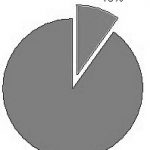
In 2001, Total Job = 40000 District Job = 4000 (10% of state)
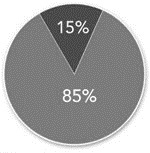
In 2011, Total Job = 34000
2011
State Job = 40000-6000 = 34000 (15 % declined)
District job share = 15% = 5100
So, Net District job growth = 5100-4000 = 1100 Jobs
Q22. Match the development schemes by Government of India in Group-I with their objectives in Group-II.
| GROUP I | GROUP II | ||
| P. | PMAY | 1. | Housing for All |
| Q. | AMRUT | 2. | Rural cluster development |
| R. | NRuM | 3. | Heritage city development |
| S. | HRIDAY | 4. | Urban mobility improvement |
| 5. | Urban rejuvenation | ||
(A) P-1, Q-5. R-4, 5-3 (B) P-1, Q-5, R-2, S-3
(C) P-3, Q-5, R-1, S-2 (D) P-4, Q-2, R-1, 5-5
(Courtesy: Abhinav)
Answer: (B)
PMAY: Pradhan Mantri Awas Yojana
AMRUT: Atal Mission for Rejuvenation and Urban Transformation
NRuM: National Rurban Mission
HRIDAY: National Heritage City Development and Augmentation Yojana
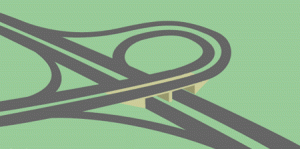
Trumpet interchange is a popular form of three leg interchange. If one of the legs of the interchange meets a highway at some angle but does not cross it, then the interchange is called trumpet interchange. Source: nptel.ac.in
Q23. The grade-separated interchange suitable for 3-legged road intersection is:
(A) Trumpet (B) Full Clover leaf (C) Diamond (D) Partial Clover leaf
Answer: (A) Trumpet
Q24. Associate the historic buildings in Group-I with their predominant materials in Group-II.
| GROUP I | GROUP II | ||
| P. | Lingaraj Temple, Bhubaneshwar, India | 1. | Red sandstone |
| Q. | Victoria Memorial, Kolkata, India | 2. | Timber |
| R. | Padmanabhapuram Palace, Thuckalay, India | 3. | Terracotta tiles |
| S. | Hunaayun’s Tomb. Delhi, India | 4. | Sandstone and laterite |
| 5. | Marble | ||
(A) P-1, Q-2, R-3, 5-5 (B) P-1. Q-4, R-3, S-5
(C) P-2, Q-1, R-3, S-4 (D) P-4, Q-5, R-2, S-1
Answer: (D)
Q25. A right-angled cone (with base radius 5 cm and height 12 cm), as shown in the figure below, is rolled on the ground keeping the point P fixed until the point Q (at the base of the cone, as shown touches the ground again.
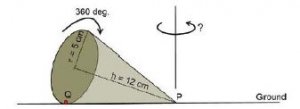
Cone with radius 5cm and height 12 cm
By what angle (in radius) about P does the cone travel?
(A) 5π/12 (B) 5π/24 (C) 24π/5 (D) 10π/13
(Courtesy: Abhinav)
Answer: (D)
This problem can also be replicated as below.
Given, h = 12 & r = 5
First, let us focus on unfolded cone.
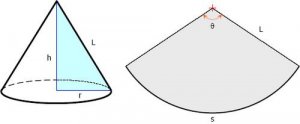
The right circular cone is unfolded
By symmetry,
(2π/2πL) = (θ/S)
So, θ = S/L (Answer)
Now, let us find S and L.
L = Square root of (12^2 + 5^2) = Square root of (144+25) Square root of 169 = 13
S = 2πr = 10π
Therefore, θ = S/L = 10π/13
(Answer provided by Vivek Aggarwal & Abhinav)
Q26. Which of the following processes is NOT used for corrosion resistance of cast iron?
(A) Painting (B) Epoxy coating (C) Quenching (D) Galvanizing
Answer: (C) Quenching
The quenching or cooling process is a part of the press hardening process for metals.
Q27. Match the terminologies in Group-I with their description in Group-II.
| GROUP I | GROUP II | ||
| P. | Pruning | 1. | Cutting of trees |
| Q. | Felling | 2. | Removing broken branches from trees for better growth |
| R. | Hoeing | 3. | Maintaining moisture content in soil by a protective layer |
| S. | Mulching | 4. | Indiscriminate cutting of branches to reduce the size of a tree |
| 5. | Loosening the ground to remove weeds | ||
(A) P-2, Q-1, R-5, S-3 (B) P-2, Q-1, R-4, S-3
(C) P-2, Q-1, R-3, S-4 (D) P-1, Q-2, R-3, S-1
Answer: (A)
Q28. The CARTOSAT 2C satellite recently launched by ISRO
(A) is a geo-synchronous satellite (B) is a part of lRNSS GPS satellite system
(C) was launched using a GSLV rocket (D) has high spatial resolution
Answer: (D) has high spatial resolution
Q29. One acre of agricultural land has been given on a lease till perpetuity at an annual rent of Rs. 10,000 to be paid at the end of each year. Net Present Value of the land parcel in Rupees assuming a discount rate of 5% per annum is
Answer: 200000
Q30. Slenderness ratio of a column is represented as:
(A) Effective length / Cross-sectional area (B) Effective length / Radius of gyration
(C) Actual length / Cross-sectional area (D) Actual length Radius of gyration
Answer: (B) Effective length / Radius of gyration
Q31. Tuscan and Composite orders are associated with
(A) Greek Architecture (B) Islamic Architecture
(C) Byzantine Architecture (D) Roman Architecture
Answer: (D) Roman Architecture
Q32. A proposed housing will have HIG, MIG and LIG units on a site measuring 60,750 sq.m. The buildable area of each category of units with respect to the total buildable area will be 30%, 50% and 20% respectively. The maxinnun allowable FAR is 2.5, ground coverage 45% and height 15 in. The maximum buildable area in sq.m of HIG units, considering a floor height of 3 in for all categories will be ______________
Answer: 41000
Q33. P, Q and R talk about S’s car collection. P states that S has at least 3 cars. Q believes that S has less than 3 cars. R indicates that to his knowledge, S has at least one car. Only one of P. Q and R is right. The number of cars owned by S is
(A) 0 (3) 1 (C) 3 (D) Cannot be determined
Answer: (A)
(Answer provided by Abhinav. Great observation by Abhinav, the same question asked in GATE (Mechanical) with a twist. Read in comment section.)
Q34. Two very famous sportsmen Mark and Steve happened to be brothers. and played for country K. Mark teased James. an opponent from country E. “There is no way you are good enough to play for your country.” James replied. “Maybe not. but at least I am the best player in my own family.”
Which one of the following can be inferred from this conversation?
(A) Mark was known to play better than James
(B) Steve was known to play better than Mark
(C) James and Steve were good friends
(D) James played better than Steve
Answer (B)
(Question & Answer provided by Abhinav)
Q35. In a company with 100 employees. 45 earn Rs. 20.000 per month. 25 earn Rs. 30.000. 20 earn Rs. 40,000. 8 earn Rs. 60,000. and 2 earn Rs. 150.000 The median of the salaries is
(A) Rs. 20,000 (B) Rs. 30.000 (C) Rs. 32.300 (D) Rs 40.000
Answer: (B) 30,000
(Question & Answer provided by Abhinav)
Q36. ‘Cold joint’ refers to the
(A) expansion joint in large span concrete members
(B) interface between an already setting concrete and a fresh batch of concrete
(C) structural crack arrested by embedding metal. rods
(D) joining of two similar metals in vacuum
Answer: (B) interface between an already setting concrete and a fresh batch of concrete
Q37. Liquidated damage refers to the
(A) cost borne by the contractor to rectify defects within defect-liability period
(B) compensation paid on breach of contract to the affected party by the other party
(C) money paid by the insurance company to the owner of insured property if it is damaged
(D) money earned by the owner from selling damaged property through auction
Answer: (B)
Q38. Select the right option representing strategic components arranged in ascending order of specified minimum area under Smart City Mission of Government of India.
(A) Greenfield development – Redevelopment – Retrofitting
(B) Redevelopment – Greenfield development – Retrofitting
(C) Retrofitting – Redevelopment – Greenfield development
(D) Redevelopment – Retrofitting – Greenfield development
Answer: (B) Redevelopment – Greenfield development – Retrofitting
Q39. Which of the following processes is NOT adopted in solid waste management?
(A) Incineration (B) Pyrolysis (C) Flocculation (D) Sanitary landfill
Answer: (C) Flocculation
Pyrolysis is a thermochemical decomposition of organic material at a very high temperature. The word is coined from the Greek-derived elements pyro “fire” and lysis “separating”.
Q40. The principle of Eminent Domain is the power to
(A) restrict exercise of rights in land through zoning and environmental laws
(B) control land use
(C) retain laud use
(D) acquire and take possession of property in order to promote public interest
Answer: (D)
Q41. In a multi-storied building, the type of plumbing system suitable for reusing the sullage for non-
potable use is
(A) single stack system (B) partially ventilated single stack system
(C) one pipe system (D) two pipe system
Answer (D) Two pipe system
Q42. In one litre of paint, volume of solid pigment and volume of non-volatile binder are 400 cc and 600 cc respectively. The Pigment Volume Concentration number of the paint is_______
Answer: 40 (This answer was challenged, earlier it was 0.4)
Pigment Volume Concentration (PVC)
% PVC = 100 * Vpigment / (Vpigment + Vnon-volatile binder)
Vpigment = pigment volume
Vnon-volatile binder = non-volatile binder volume
Q43. Data on ‘households with one or more married couples sharing room with a person aged 12 years or more’, is used for computing
(A) housing density (B) housing shortage
(C) homing price (D) housing affordability
Answer: (B) housing shortage
Q44. In Geographic Information System, DEM represents information on
(A) vegetation cover (B) soil type (C) water table (D) topography
Answer: (D) topography
DEM (Digital Elevation Model) The representation of continuous elevation values over a topographic surface by a regular array of z-values, referenced to a common vertical datum. DEMs are typically used to represent the bare-earth terrain, void of vegetation and manmade features. Source: esri.com
Q45. In which of the following models does the private partner own the revenue as well as the risk
associated with the project for a limited period of time?
(A) Build. Own, Operate (BOO)
(B) Build, Own, Operate, Transfer (BOOT)
(C) Design, Build, Finance, Operate (DBFO)
(D) Design, Bid, Build (DBB)
Answer: (B) BOOT
Q46. Excellence in Design for Greater Efficiency (EDGE) programme DOES NOT focus on
(A) lower carbon emission (B) greater resource efficiency
(C) cost effectiveness (D) labour safety
Answer: (D) labour safety
EDGE calculates the utility savings and reduced carbon footprint of a green building against a base case. For non-residential buildings, it can be seen how much extra it costs to build green – and how short a time it takes to earn back the money through operational savings. By entering as much of the building’s information as possible into the EDGE software, and choosing systems and solutions, savings grow.
Q47.The concepts of ‘serial vision’, ‘punctuation’ and ‘closure’ were proposed by
(A) Le Corbusier (B) Louis Kahn
(C) Gordon Cullen (D) Kevin Lynch
Answer: (C) Gordon Cullen
Q48. Match the international events in Group-I with their directives in Group-II.
| GROUP I | GROUP II | ||
| P. | Earth Summit, Rio de Janerio, 1902 | 1. | Kyoto Protocol |
| Q. | UN Framework Convention on Climate Change, New York | 2. | Agenda 21 |
| R. | UN Sustainable Development Summit, New York, 2015 | 3. | Heritage conservation |
| S. | Habitat H, Istanbul, 1996 | 4. | Agenda 2030 |
| 5. | Housing for All | ||
(A) P-1, Q-5, R-4, S-3 (B) P-1, Q-5, R-2, S-3
(C) P-2, Q-1, R-4, S-5 (D) P-2, Q-1, R-5, S-4
Answer: (C)
Q49. Match the planning techniques in Group-I with their salient features in Group-II.
| GROUP I | GROUP II | ||
| P. | Land pooling | 1. | Assigning specific task on a short time horizon |
| Q. | Action Plan | 2. | Assembling privately owned land parcels for development |
| R. | Land sharing | 3. | Agreement for reallocation of land between occupiers and owners |
| S. | Transfer of Development Rights | 4. | Assigning specific task on a long time horizon |
| 5. | Incentive based voluntary shifting of FAR of a plot to another plot | ||
(A) P-1, Q-5, R-4, S-3 (B) P-2, Q-1, R-3, S-5
(C) P-2, Q-1, R-3, S-4 (D) P-4, Q-2, R-1, S-5
Answer: (B)
Q50. Match the land use classes in Group I with the use zones in Group II
| GROUP I | GROUP II | ||
| P. | Transportation | 1. | Sports complex |
| Q. | Commercial | 2. | Heritage and conservation areas |
| R. | Public and Semi-public | 3. | Burial ground |
| S. | Recreational | 4. | BRT corridor |
| 5. | Service sector | ||
(A) P-4. Q-1. R-3. S-5 (B) P-5, Q-3. R-1. S-2
(C) P-4. Q-5. R-1, S-2 (D) P-4, Q-5, R-3, S-1
Answer: (D)
Q51. Match the parameters in Group I with their units in Group II
| GROUP I | GROUP II | ||
| P. | Traffic flow | 1. | Metre |
| Q. | Traffic density | 2. | Cycles/second |
| R. | Right of Way | 3. | Seconds |
| S. | Traffic simal cycle length | 4. | Vehicle/km |
| 5. | PCU/hr | ||
(A) P-5, Q-4, R-1, S-2 (B) P-5, Q-4, R-1, S-3
(C) P-S, Q-2. R-4, S-3 (D) P-4, Q-5, R-1, S-3
Answer: (B)
Q52. Calculate the volume of cement in cubic metre required for making 10 cubic metre of M20 grade Plain Cement Concrete work assuming the ratio of dry concrete mix to wet concrete mix as 1.52.
Answer: 2.7 to 2.9
Q53. A room measures 3 m (width) x 4 m (length) x 3 in (height). The outdoor temperature is 36 °C. The volumetric specific heat of air is 1300 J/cu.m.°C. The ventilation heat flow rate in Watts required to attain an internal room temperature of 26 °C with 3 air changes per hour is
Answer: 390
Q54. Match the equipment in Group-I with their applications in Group-II
| GROUP I | GROUP II | ||
| P. | PR | 1. | Air conditioning |
| Q. | FCU | 2. | Lighting |
| R. | OLED | 3. | Power generation |
| S. | BIPV | 4. | Motion detection |
| 5. | Daylight sensing | ||
(A) P-4, Q-5. R-2, S-1 (B) P-1, Q-4, R-5, S-3
(C) P4, Q-1, R-2, S-3 (D) P4, Q-2, R-5, S-1
Answer (C)
Q55. Match the distinguished housing projects in Group -I with their architects in Group-II
| GROUP I | GROUP II | ||
| P. | Nagakin Capsule Tower. Tokyo. Japan | 1. | Walter Gropius |
| Q. | Tara Apartment, New Delhi, India | 2. | Moshe Safdie |
| R. | Habitat 67. Montreal, Canada | 3. | Ralph Erskine |
| S. | Byker Wall, New Castle. England | 4. | Charles Correa |
| 5. | Kisho Kurokawa | ||
(A) P-5, Q-4, R-2, S-3 (B) P-1, Q-3, R-4, S-5
(C) P-5, Q-2, R-1, S-4 (D) P-5, Q-4, R-2, S-1
Answer (A)
Q56. Associate the structural systems in Group I with the buildings in Group II.
| GROUP I | GROUP II | ||
| P. | Folded plates | 1. | Kurilpa Bridge, Brisbane |
| Q. | Shell | 2. | Eden Project, Cornwall |
| R. | Tensegrity | 3. | Riverside Museum. Glasgow |
| S. | Pneumatic | 4. | MIT Auditorium, Boston |
| 5. | 30, St. Mary Axe, London | ||
(A) P-3, Q-4, R-1, S-2 (B) P-5, Q-4, R-3, S-1
(C) P-3. Q-2. R-1, S-5 (D) P-1. Q-3. R-4. S-2
Answer (A)
Q67. A circular plate inclined at an angle 0 with horizontal plane generates an ellipse as top view with major axis and minor axis of 5 cm and 2.5 cm respectively. The value of 0 in degrees is___________
Answer: 60
Q58. Match the instruments in Group I with the corresponding tests in Group II.
| GROUP I | GROUP II | ||
| P. | Pycnometer | 1. | Initial and final setting time |
| Q. | Brinell’s Apparatus | 2. | Abrasion test |
| R. | Los Angeles Apparatus | 3. | Surface hardness test |
| S. | Vicat’s Apparatus | 4. | Slump test |
| 5. | Apparent Specific gravity | ||
(A) P-5, Q-3, R-2, S-1 (B) P-5. Q-4, R-2. S-1
(C) P-3, Q-2,R-1. S-5 (D) P-2. Q-3, R-4, S-1
Answer (A)
Q59. Match the planning tasks in Group I with the tools of analysis in Group II.
| GROUP I | GROUP II | ||
| P. | Population projection | 1. | Input-Output Analysis |
| Q. | Regional resource allocation | 2. | Hardy Cross Method |
| R. | Trip distribution | 3. | Cohort Analysis |
| S. | Design of water distribution network | 4. | Gravity Model |
| 5. | Moving observer method | ||
(A) P-3, Q-1, R-4, S-2 (B) P-3. Q-5,R-4, S-1
(C) P-5, Q-1,R-3, S-4 (D) P-1. Q-3,R-5. S-2
Answer (A)
Q60. As the two speakers became increasingly agitated, the debate became
(A) lukewarm (B) poetic (C) forgiving (D) heated
Answer (D) Heated
Q61. He was one of my best______________and I felt his loss____________
(A) friend, keenly (B) friends, keen (C) friend, keener (D) friends, keenly
Answer (D)
Explanation here: https://www.quora.com/Which-usage-is-right-One-of-my-friends-or-one-of-my-friend
Q62. Let S1 be the plane figure consisting of the points (x, y) given by the inequalities Ix – 1l ≤ 2 and ly +2 l ≤ 3. Let S2 be the plane figure given by the inequalities x – y ≥ – 2, y ≥ 1 and x ≤ 3. Let S be the union of S1 and S2. The area of S is
(A) 26 (B) 28 (C) 32 (D) 34
Answer (C) 32
Q63. “Here, throughout the early 1820s, Stuart continued to fight his losing battle to allow his sepoys to wear their caste-marks and their own choice of facial hair on parade. being again reprimanded by the commander-in-chief. His retort that ‘A stronger instance than this of European prejudice with relation to this country has never come under my observations’ had no effect on his superiors.”
According to this paragraph. which of the statements below is most accurate?
(A) Shun’ s commander-in-chief was moved by this demonstration of his prejudice.
(B) The Europeans were accommodating of the sepoys’ desire to wear their caste-marks.
(C) Stuart’s ‘losing battle’ refers to his inability to succeed in enabling sepoys to wear caste-marks.
(D) The commander-in-chief was exempt from the European prejudice that dictated how the sepoys were to dress.
Answer (C)
Answered by Shivam Chandak
Q64. What is the sum of the missing digits in the subtraction problem below?
5 _ _ _ _
– 4 8 _ 8 9
_______________
1 1 1 1
(A) 8 (B) 10 (C) 11 (D) Cannot be determined
Answer (D) Cannot be determined
Q65. The growth of bacteria (lactobacillus) in milk leads to curd formation.
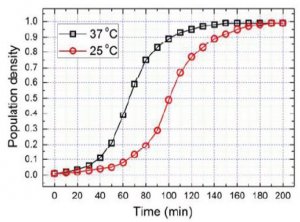
Growth of bacteria (lactobacillus) in milk at two different temperatures.
A minimum bacterial population density of 0.8 (in suitable units) is needed to form curd. In the graph below, the population density of lactobacillus in 1 litre of milk is plotted as a function of time, at two different temperatures 25 °C and 37 °C.
Consider the following statements based on the data shown above:
i. The growth in bacterial population stops earlier at 37 °C as compared to 25 °C
ii. The time taken for curd formation at 25 °C is twice the time taken at 37 °C
Which one of the following options is correct?
(A) Only i (B) Only ii (C) Both i and ii (D) Neither i nor ii
Answer (A) Only i

ans of 53
volume of room = 3 x 3 x4=36sqm
given air change is 3, therefore volume of air replaced is = 3×36= 108m3
energy that there is in 108m3 volume of air to replaced = (volume of air)x (specific heat) x temperature difference)
that is = 108x1300x(36-26) = 1404000J
in 3600sec ebergy tobe taken out = 1404000/3600= 390watt
For question 20 they gave 60 persons for 500mm …. That a unit is 500mm or 50cm…. By the code book for a public building their should be minimum 2m wide entry / exit should be provided ….. Then for the for the population the width of the door is increased by units …. So for 2.2 m door …. 2.2m door the unit entry is 4 units …. Therefore 4*60
And there are 4 such doors …. So 4*60*4 = 960 people is correct answer …. Which is provided by gate official….
Q.20. NBC EXIT DOOR CALCULATION ..
ans..960 right.
nbc 2005..given the exit door.
capacities of exits
the unit of exit width,used to measure the capacity of any exit,shall be 500mm. a clear width of 250mm shall be counted as an additional half unit.clear width less than 250mm shall not be counted for the exit width..source by nbc 2005
so..question given.each door exit dimension 2.2m.
we are calculate the occupant by each floor 2m.
thats means..2m to 2000mm*4 exit =8000mm
now divide by 500mm width given for 60 occupant..
so 8000mm/500mm =16 and multiply 4door width 2m.
now multiply 16*60= 960 answer.
thanks… for gatearchitecture.com
Can anyone tell me….who has got selected for IITKGP MCP course 2017 in the first round (Mentioning the GATE RANK 2017) please ??
My mark is 53.99 after checking revised answer key…any guess about Rank?
Hi admin,
Which all questions are challenged.. Has someone challenged the smart city question?
what will be the expected cut off of gate-2017??
Any idea whether gate will revise answer key and publish it in case of changes ?
Happening here for first time. Let us wait n watch. We are expecting.
Revised answer key published today
hi Admin
In ur knowledge, Has anyone challenged the 960 – 1056 Answer ? ( ppl from fire Exit )
No one yet challenged this question in our circle. Answer Key Challenge option is closed now. However answer 960 also seems to be correct. See the solution in the comment box.
i got 1056 ans by taking width 2.2m
In Question no. 64 where sum of missing digits has to be determined.. why the answer is D.?? when the missing digits can be easily determined.. its
50000-48889=1111
and sum of missing digits –
0+0+0+0+8=8
plz tell me..
50100-48989=1111.
so it can be 0+1+0+0+9=10 also.
So answer is ‘cannot be determined.
u guyz who made this site are awesome….
just tell me what will happen with the question for which theygave the wrong answer … the 960 instead of 1056 (fire exit question 49 )
i will be in seven heavens if u reply soon
This type of question seems to confuse or encourages aspirants to make an error. They might have made an assumption. 0.5 m width of door is assumed as one unit. So, for 2.2 m width of door can be assumed as 4 units (not in fraction like 4.4 because for extra 0.2 m width, a person can not pass through the door).
We have 4 such doors, so 4 x 4 =16 units
1 unit has capacity of 60 person.
Therefore, occupancy = 16×60 = 960
my mark is 59.33 as per the key. what will be my score and rank tentatively?
A very good rank. Please wait.
52.66 out of 100, whqt should be my tentative rank?
AIR under 50
Thank you. And whats about the Q42, value of PVC. 0.4 or 40. I have gone through IS 101: Part 8 section 2 and 6. It should be 40.
Did you challenge this question? You have a very good reference.
Yes, I have challenged.
Challenge Won, answer key has changed and converted to 40 from 0.4
sir can u please tell me how to prepare for gate 2018
what will be the average and the highest this year…any idea??
Cutoff 35, Highest 75 (hopeful)
hi admin … can u please check the anser of querstion 49 as per paper issued by gate … its showing 960 but 1056 is the expected answer
sir can you please tell me how to prepare for gate 2018.
mail id- [email protected]
Q 47. Ans is Gordon Cullen
Q 55. Ans is A
The paper was tough ,previous year question papers had some pattern ,but 2017 paper was very tricky and didn’t follow any pattern ,even in match based questions ,if a person knows 3 answers ,then he/she will get confused in the last option
There was one match d following in which moshe safdie was… In that ques there was one bulding in london or england… what was its name??
Byker housing in England
AND OTHER ARCHITECTS WERE??
For Q32. Two ways to solve….
1. By FAR: 60750 X 2.5 = 151762.5
So total built-up = 151762.5
30% of this built-up = 45,528.75
2. By ground cover:
60750 X 0.45 = 27317.50
No. Of floors is 5
So, 27317.5 X 5 = 1365875
30% of this = 40,976.25
I don’t know which is correct. But I feel both are right
By FAR: 60750 X 2.5 = 151762.5
So total built-up = 151762.5
30% of this built-up = 45,528.75
Now ground coverage 45% of 45.528.75= x abd the x will be the ground c9verage and then we will multiply this area by 5 and we will get the max area. The ques was.. what will be the maximum area of hig.. and it was also mentioned that the distribution percentage was with respect to buildable area
45% of the site is ground cover… Why did you multiply 0.45 by 30% built-up??
40976 is the right ans , because via far we could achieve maximum permissible built up but here ground coverage and height restrictions are fixed… in equation 1 if we utilised complete far no of stories are 5.55 but the permisssible no of floor and height are given I.e 5 story. Hence we must follow given ground coverage and no of story
Hey evryone!! I have something in my mind. In that mig lig.. ques. Evrybody came wid different methods and all. But i think that sabke answers correct except ehose who didnt use far in calculation. The ques is how??
So here is the theory… No matter what were steps 1 by 1.. how much percentage of wat… The thing is.. when we put everything in one equation… We will gat the same ans.. becoz it is mutiplicatio. After all.. and then the ans is after the calculation is multiplied by 5..
ans of q 23 is trumpet
Trumpet interchange: Trumpet interchange is a popular form of three leg interchange. If one of the
legs of the interchange meets a highway at some angle but does not cross it, then the interchange is called
trumpet interchange. A typical layout of trumpet interchange is shown in figure 39:2.
2. Diamond interchange: Diamond interchange is a popular form of four-leg interchange found in the
urban locations where major and minor roads crosses. The important feature of this interchange is that
it can be designed even if the major road is relatively narrow. A typical layout of diamond interchange is
shown in figure 39:3.
3. Clover leaf interchange: It is also a four leg interchange and is used when two highways of high volume
and speed intersect each other with considerable turning movements. The main advantage of cloverleaf
intersection is that it provides complete separation of traffic. In addition, high speed at intersections
can be achieved. However, the disadvantage is that large area of land is required. Therefore, cloverleaf
interchanges are provided mainly in rural areas. A
in question 16, the excavation one,it was mentioned that cut and fill method should be used. so, in my opinion the correct answer should be 3000 cum. i mean that is the minimum excavation required. thoughts..?
It also said that slope is along longer direction..so shudnt the 40m side be having the slope?
q.23 – I think 3 legged intersection- is Trumpet interchange
q.27- hoeing- used for removing weeds.
Ques .29. the property value = year’purchase × net rent i.e. 100/rate of interest ×10k.
q 22 one option is housing to all
Pmay.. pradhan mantri awas yojana_housing to all
Amrut_ atal mission rejuvenetion…. Which will replace jnnurm
Hriday_heritage cities development
Nrum_rural urban cluster..
My confusion is that what was the fourth option actually..
urban mobility
Urban mobility is not correct. It is rural cluster development
There is one cone of radius 5 m and height 12 m if opened the angle subtended by arc. Find
out the angle in term of (pie)
10/13 *22/7
Mark and Steve were brothers who played for a country k, James was another player who
played for country E.Mark used to tease James by saying “there is no way you’re good enough
to play for your country”, to this, James would say “at least i am the best player in my family”…
what conclusion can be drawn from the above paragraph
(A) mark plays better than James,
(B) mark plays better than Steve,
(C) Steve is known to play better than mark
(D) Steve and mark are good friends
[Ans. C]
100 Employees
45 get 20,000/- salary
25 get 30,000/- salary
20 get 40,000/- salary
8 get 60,000/- salary
2 get 1, 50,000/- salary
Median of the above data is
[Ans. *]
30,000
I think it’s 32300
Was it median or mean??
q 33 ans is 3
qstn is just reversed in mechanical exam
P, Q and R are three people talking about number of cars the person S is having
P says that S is having at least 3 cars
Q says that S is having less than 3 cars
R says that S is having at least 1 car
If only one of them is correct, then whose statement is correct?
(A) P
(B) Q
(C) R
(D) None of these
if p is right saying S is having aleast 3 cars then r is also right which is contradiction to the answer
so
if s having 0 cars then only q is right
P states that S has atleast 3 cars = > 3
Q believes that S has less than 3 cars = 1
P’s and Q’s statements are exactly opposite in nature and R’s statement is proportional to P’s
statement.
From the given data, only one person statement is right as it mean that two person statements are
wrong. i.e., P and R when S has zero cars.
tuscan and composite column are in roman
doric ionic and corinthian in greek
In 2001 ,the population is 500000, rate of growth is 5% per decade, house hold size 4.5.exisiting no : of houses is 100000.what will be the number of dwelling units needed for 2021 ? 10,000 du will be constructed by 2011 and 5000 will be obsolete by 2021
122500-105000=17500
122500-105000-10000 = 7500
(10000 du already complete in 2021 and hence this number to be deducted from overall requirement)
I think 17500 is correct.
does any1 remember the rotated cone question?
10/13*22/77
a one qstn is based on satelite
revit auto cad software related to bim
What were the options btw??
bim aur gis
use of dem
ans is topography
i cant understand the paper pattern .in the qstn paper missed so many technical topic . a one qstn is related to conference agenda why ask this qstn too much numerical problem based on aptitude test. in a 2 marks qstn only two type of qstn 1 is matching and another one is numrical
i wish i could know which ques were of 2 and 1 marks? can anyone help ?
Constricted end velocity was to be found if non constricted end had velocity 2m/s diameter of constricted end was half of that of the non constricted
v1 x a1 = v2 x a2
That way, v2 = v1 x a1/a2 = v1 x (r1)^2/(r2)^2
= 2 x 4 = 8 m/s
The paper was quite difficult this time as compared to previous years.The numericals were little tricky and also the architecture theory questions were little wierd and on a difficult side
What were names of archutects in the optio. building names multuple chouce ques..
In a question of contracter’s fee … How was it solved..
60000 was the cost quoted by contractor. 70000 was the actual cost. Therefore 10000 was the overrun. Then simply multiply with percentage… Which I don’t remember… I guess overrun was 20%
8500 was the answer
8500 was the answer. his fees 15% of total project cost 70k was 10500 – 20% penalty for overrun cost 2000= 8500
10500 is contractor fees
20% is the penalty, hence 10500 – 2100 = 8400
Will u plz explain that how would u find overrun cost 2000?
What was the ans related to road safety… Median , shoulder??
shoulder, i think
What was the exactly question do yoy remmeber.
Super elevation is the answer… Basically means banking of road
super elevation is right
It is superelevation.
40 watts 40-efficacy and 3 m distance find lux
1600/3^2
Excavation sum…. 40X30 m is plot size slope is 30 degrees how much is needed to be excavated to make this plot flat? Slope is along the longer side of the site
The truss sum….
Population increase 5% per 10 years . Initially 500000 ppl and 100000 DU in 2031 how many more will be needed?
Assume 10000 new houses built in 2021
5000 will be unusable in 2031
which tree in columnar form
tarmendarous indica
delonex regia
c
d
Longifolia is the right answer
Was there any option of peepal tree real name)
60 ppl can move through 500 mm then how many through 2.2 m X 4 ? Occupancy?
for 60 ppl -.5m
therefore for 1 person =.5/60=.0083 (aprox -.008)
so , with regard to 2.2 m it will be – 2.2 /.008=275
therefore .for 4 such doors it will be 275*4=1100 ppl
but if u solve it directly like,
.5 —- 60 ppl
so ,2.2 —
(2.2*60)/.5=264 therefore 264*4=1056
the approx makes a diff of 44 :/ so will the answer be given in a range ?
PERT sum…. Optimistic time 12 months normal 14 months pessimistic time 18 months … Estimated time?
(12 + 14×4 + 18) / 6 = 14.33 months
length of the ramp in m for 600mm plinth according to cpwd guidlines
1:12 should be the slope I guess
True
A pointed arch having two centers and radii greater than the span.
Gothic, Roman,
Was Lancet an option?
Its Lancet
lancet ka center arch ke bahar hota hai radius jyada hoti hai
lancet is correct
gothic
lancet
GRIHA minimum points for certification
a) 35
b)50
c) 60
d) 100
50
But there was 40 as an option too.. isn’t it??
The option was 40 and the answer is 40
it was 50 , please check
the answer is 50, please check
Who was rekated to historicism?? Joseph paxton or walter gropius
joseph paxton
Or walter gropius??
Bauhaus
Joseph Paxton
thanku brother you help me a lot
Great! I will try few..